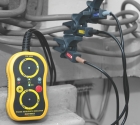Martindale simplifies the measurement of phase rotation

Martindale Electric offers a range of testers to verify the sequence, or rotation, of 3-phase circuits. Getting the phase sequence wrong can have devastating consequences for plant and machinery, with serious implications for machine safety. From motors running backwards through to cooling or lubricating systems underperforming, one wrong connection can lead to a major maintenance headache.
One solution is the PSI4000 (pictured) and PSI4300 non-contact phase-sequence indicators to quickly and accurately identify 3-phase sequences for motor installations and other systems. These instruments are designed for use on insulated and uninsulated conductors and carry out measurements via inductive crocodile clips that reduce the risk of coming into contact with live parts.
Another solution is the PC15250 phase-rotation indicator, which can quickly and simply prove the presence of all three live phases, or identify which are faulty, and show the sequence of phase rotation when all three phases are confirmed as present.
As well as long exposed tips for reaching contacts that are difficult to access and shorter tips for increased safety, the PC15250 also has retractable GS38 shrouds and comes supplied with integral fused heads, crocodile clip and test probes that conform to Health & Safety Executive guidance GS38.
Other instruments that can provide phase-sequence indication are the VT28 voltage indicator and the ET4000 and ET45000 17th Edition multi-function testers.







